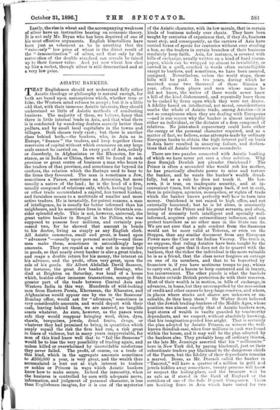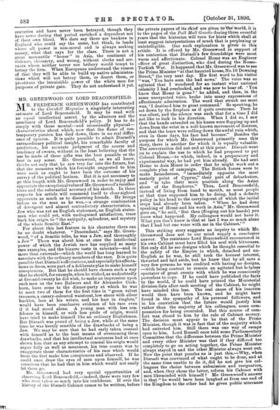ASIATIC BANKERS.
THAT Englishmen should not understand fully either Asiatic theology or philosophy is natural enough, for both are based upon assumptions which, whether true or false, the Western mind refuses to accept ; but it is a little odd that, with their immense Asiatic interests, they should understand so little of Asiatic methods of conducting business. The majority of them, we believe, fancy that there is little internal trade in Asia, and that what there is is conducted by wandering dealers scarcely better than pedlars, and by small local capitalists in the towns and villages. Both classes truly exist ; but there is another class behind both,—the bankers, who, in Asia as in Europe, " finance " the traders, and keep together those reservoirs of capital without which commerce on any large scale cannot be carried on. In every part of Asia, orderly or disorderly, in Afghanistan or the Khanates, for in- stance, as in India or China, there will be found in each province or great centre of business a man who bears to the traders of that province, and sometimes far beyond its confines, the relation which the Barings used to bear to the firms they favoured. The man is sometimes a Jew, sometimes a Parsee, sometimes an Armenian, but more usually a native of the land ; he is the head of a firm, usually composed of relations only, which, having by local or other trade accumulated a capital, has turned banker, and furnishes means to a multitude of smaller and more active traders. He is invariably, for patent reasons, a man of intelligence, he is usually far better informed than his neighbours, and he sometimes lives in what Orientals con- sider splendid style. This is not, however, universal, the great native banker in Bengal in the Fifties, who was supposed to possess four millions, and certainly pos- sessed two, for he showed that amount in bonds to his doctor, living as simply as any English clerk. .All Asiatic commerce, small and great, is based upon "advances "—usually upon personal security—and these men make them, sometimes in astonishingly large amounts. They are repaid as a rule not in money but in goods, so that nearly every banker is also a great trader, and reaps a double return for his money, the interest on his advance, and the profit, often very great, upon the sale of his goods. Sir Albert Abdallah David Sassoon, for instance, the great Jew banker of Bombay, who died at Brighton on Saturday, was head of a house which, besides other immense transactions, managed the greater part of the trade between Central Asia and Western India in this way. Hundreds of wild-looking men from Eastern Persia, Khorassan, the Khanates, and Afghanistan would appear one by one in the Sassoons' Bombay office, would ask for "advances," sometimes in very considerable amounts, and would depart with their cash, leaving behind them, we are assured, no tangible assets whatever. As sure, however, as the passes were safe they would reappear bringing wool, skins, dyes, shawls, turquoises, jewels, dried fruits, drugs, or whatever they had promised to bring, in quantities which amply repaid the risk the firm had run, a risk great in times of violence, but in many years inappreciable, for men of this kind knew well that to "fail the Sassoons" would be to lose the very possibility of trading again, and unless killed or overwhelmed by unavoidable misfortune they never failed. The profit, of course, on a trade of this kind, which in the aggregate amounts sometimes to 4350,000 a year, is very great, and the wealth thus accumulated is lent out at high interest to traders or nobles or Princes in ways which Asiatic bankers know how to make secure. Indeed the insecurity, when the business is controlled by men with adequate nerve, information, and judgment of personal character, is less than Englishmen imagine, for it is one of the mysteries of the Asiatic character, with its low morale, that in certain kinds of business nobody ever cheats. They have been taught by centuries of experience that, if they do, business must stop, and consequently, as the carriers of Asia have carried boxes of specie for centuries without ever stealing a box, so the traders in certain branches of their business resolutely keep faith. Asia, for instance, is covered with bills of exchange, usually written on a kind of hard tissue- paper, which can be wrapped up almost to invisibility, or carried in a quill, couched in words often unintelligible except to bankers, and sometimes, we have been assured, unsigned. Nevertheless, unless the world stops, those bills will be paid. In ten years, during which he received some two thousand of these flimsies a year, often from places and men whose names he did not know, the writer of these words never knew a bill of the kind dishonoured, and repeatedly knew them to be cashed by firms upon which they were not drawn. A fidelity based on intellectual, not moral, considerations marks the whole of Asiatic trade, among Asiatics—it is not so conspicuous when they are dealing with Europeans —and is one reason why the banker is almost invariably either an individual, or the dictator of a firm composed of relatives. No joint-stock coparcenary could have either the energy or the personal character required, and as a matter of fact, we believe, some attempts made by ordinary European banks to obtain the high interest paid on loans in Asia have resulted in annoying failure, and declara- tions that all Asiatic borrowers are scoundrels.
There are two puzzles connected with Asiatic banking of which we have never yet seen a clear solution. Why does Surajah Dowlah not plunder Omichund ? The Prince is often a scoundrel who would rob his mother, he has practically absolute power to seize and torture the banker, and he wants the banker's wealth dread- fully, but as a rule he does not touch it. He bor- rows, it is true, on inadequate security, and at in- convenient times, but he always pays back, if not in cash, then in privileges, agencies, monopolies, or rights of trade which the banker knows perfectly well how to turn into money. Omichund is not raised to high office, and not externally honoured ; but he is let alone, is constantly consulted by the Prince and his great servants, and often, being of necessity both intelligent and specially well- informed, acquires quite extraordinary influence, and can protect travellers as no other man in the State can do. We are not sure that a safe conduct from the Sassoons would not be more valid at Teheran, or even on the Steppes, than any similar document from any European Power save the Czar or the Indian Viceroy. The truth is, we suppose, that ruling Asiatics have been taught by the experience of ages that it does not do to quarrel with the bankers, that the richer the individual is the more valuable he is as a friend, that the class never forgives an outrage on one of its members, and that to be boycotted by financiers is, if you have mutinous troops to pay, whims to carry out, and a harem to keep contented and in luxury, too inconvenient. The other puzzle is what the bankers in States outside British protection do with their reserves. Most of their wealth is in motion, in bills of exchange, in advances, in loans,but they arecompelled by the necessities of credit and other causes to keep large reserves, and where, in places where stocks and shares are unknown or un- saleable, do they keep them ? Sir Walter Scott believed that the Jewish trading-bankers of the Middle Ages, whose position was almost exactly that of Asiatic bankers now, kept stores of wealth in vaults guarded by trustworthy dependants, and we suspect, without absolutely knowing, that his imagination guided him aright. That is certainly the plan adopted by Asiatic Princes, as witness the well- known Scindiah case, when four millions in cash was found within the house, and it may well be the plan adopted by the bankers also. They probably keep off ordinary thieves, as the late Mr. Jennings asserted that his " millionaire " hero in New York did, by paying blackmail, just as their subordinate traders pay blackmail to the dangerous chiefs of the Passes, but the fidelity of their dependants remains a marvel. Besso, as Mr. Disraeli called the banker in " Tancred," will have a quarter of a million in gold and jewels hidden away somewhere, twenty persons will know or suspect the hiding-place, and the treasure will be as safe as if stored in the Bank of England or the corridors of one of the Safe Dcposit Companies. There are banking firms in Asia which have lasted for two centuries and have never been •betrayed, though they have never during that period enriched a dependant not of their own blood. We dare say there are bankers in England who could say the same, but think, in lands where all power is non-moral and is always seeking money, what that says for the class. There is not a great mercantile " house " in Asia, the continent of violence, chicanery, and wrong, without clerks and ser- vants whom neither terror nor bribery would tempt to betray the firm. When Europeans understand the reason of that they will be able to build up native administra- tioss whieh will not betray them, or desert them, or prostitute the irresistible power of the white men for purposes of private gain. They do not understand it yet.











































 Previous page
Previous page